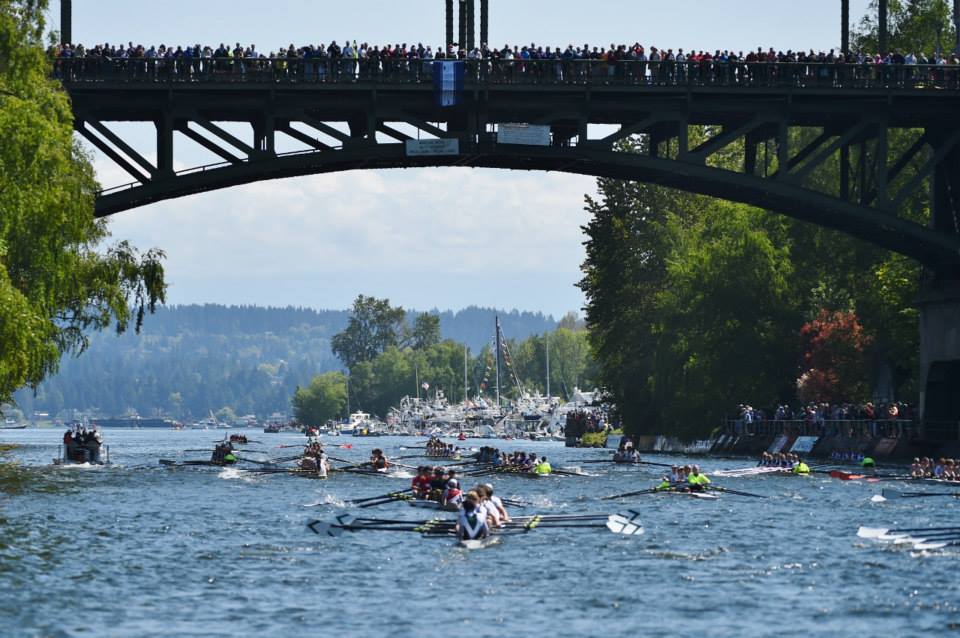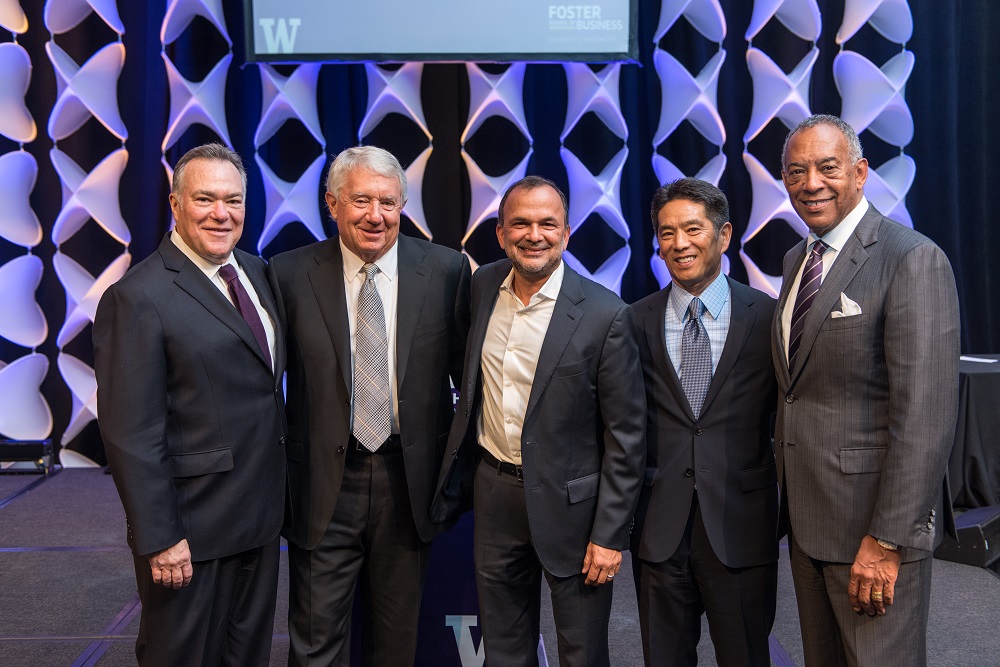Never Too Late to Graduate
Windermere founder John Jacobi earns his UW degree six decades after commencing studies at the Foster School
The UW Foster School of Business Class of 2020 graduated virtually in June after an anomalous end to an extraordinary year. Among the resilient ranks receiving diplomas was one person as suited to deliver a commencement address as he is to consume one.
Six decades after beginning his business studies at the UW, John Jacobi has—finally—graduated.
Jacobi is the founder and retired chairman of Windermere, one of the largest real estate companies in the western United States. Having left day-to-day operations to the second generation of family leadership a few years ago, he finally found time and inspiration to complete the work and finish a journey that commenced in 1960.
“A few guys in school stretched out their education for five or six years. I even knew a guy who took seven,” says Jacobi, with a laugh. “But I never heard of someone taking 61 years to graduate!”
Six-decade detour
That’s not how he planned it. Jacobi’s affinity for the UW goes way back. He grew up just a few miles north of campus and began a nearly religious commitment to Husky athletics after attending his first football game with his father at age seven.
After graduating from Roosevelt High School in 1959, he was determined to become a Husky himself.
First, though, he had to serve six months of active duty in the Coast Guard to fulfill a portion of his obligated national service. When Jacobi finally turned up on campus for winter quarter, he was already several credit hours behind. And when his classmates were donning cap-and-gown four years later, Jacobi was still a few credits short.

“I had every intention of going back to finish,” he says. “But I got married, started having kids and I needed to work. It just became one of those things where I’d say, I’ll get to it next quarter…”
Jacobi’s career began in lending, advertising and real estate development for Puget Sound Mutual Savings Bank before, after a decade, deciding it was time to fly. “I had learned to make money for the bank,” he recalls. “Now I wanted to do my own thing.”
A risky bet
It wasn’t the ideal time to do his “own thing.” Seattle in the early 1970s was on life support. The infamous Boeing Bust kicked off an era pockmarked by Vietnam, Watergate, a global energy crisis, skyrocketing unemployment and interest rates, and protracted years of “stagflation.”
Yet Jacobi was undeterred. He and a friend considered buying a golf course and a plumbing supply company before noticing a small real estate office for sale in the Windermere neighborhood of Seattle, not far from the UW and his childhood home.

Jacobi borrowed $15,000 for the down payment from his father on the $85,000 purchase. “It was a ridiculous amount of money at the time,” Jacobi says. “I didn’t know anything about real estate.”
Moreover, the eight agents at the office were all independent contractors, with every right to walk out the door if they didn’t like the new owner. “I’d have paid $85,000 for a bunch of metal desks and some indoor and outdoor carpeting,” he jokes.
But they didn’t walk. And Jacobi learned volumes from that core team of agents who were both educated and ethical in a business which, at the time, was often blighted by shady sales tactics.
Jacobi never had much time to dwell on the future. Success, to him, was just enjoying the work and making enough money to take care of the family. “It was tense in those early days,” he remembers. “A matter of survival.”
Until it became more. Much more.
In and of the community
After expanding Windermere to eight Seattle offices, Jacobi ventured beyond city borders through an affiliate network beginning in 1984. This grew contiguously over the ensuing years, across Washington, then Oregon, then beyond.
Today, more than 6,500 Windermere agents work out of 300 offices in a network that stretches from Alaska to Arizona, Montana to California, Hawaii to Mexico.
Jacobi credits this growth to a focus on community over size or sales. From really listening to the wants and needs of customers. And from getting involved in their communities. “I mean, we are selling houses in the community. That’s how we make a living,” he says. “So why wouldn’t we support those communities?”

It started with sponsorship of Little League teams and middle school orchestras, which resonated with both clients and employees. Jacobi established Windermere’s annual Community Service Day in 1984. His lifelong support of Husky athletics became most evident in the 1987 launch of the Windermere Cup, which pits Husky men’s and women’s rowing against the best in the world each May. And the Windermere Foundation, established in 1989, has provided more than $30 million to non-profit organizations that support low-income and homeless families.
A few years ago, Jacobi and his wife, Rosalind, whom he met at the UW, made a $5.4 million gift to their alma mater to create an undergraduate minor in real estate studies and two endowed faculty chairs.
A family way
Jacobi has received plenty of accolades for his life’s work, among them the Foster School’s 2015 Distinguished Leadership Award. But he prefers to spread credit for Windermere’s success and philanthropy far and wide: to his parents, mentors, employees and legions of friendships forged over a lifetime.
“My whole career is built upon relationships with people,” Jacobi says. “And most of them were made at the University of Washington.”

Not all of them. A few key relations came in the years after, namely his children, who have been part of the business since they were kids sweeping sidewalks. Today, they are building on their father’s legacy.
Chief among the second generation of family leadership are son OB Jacobi, daughter Jill Jacobi Wood and son-in-law Geoff Wood, who serve as co-presidents of Windermere Real Estate (Wood, who received his master’s degree from Foster in 1993, is also CEO of Windermere Services Company).
Though retired as chairman, John Jacobi still serves on the company board. And he watches his progeny work with equal measures of admiration and pride.
“How do you measure success?” he asks. “To see my kids take something that I’ve created and turn it into something even better… that’s about as good as it gets.”
Promise kept
Another measure of success is a college diploma. And failing to finish at the UW had always bothered Jacobi. After a lifetime of encouragement from a family full of teachers (including his wife, his sister and two of his daughters), he was finally inspired to action at the commencement of one of his granddaughters a few years ago.
But there would be nothing honorary about his UW degree in business administration. He had to earn it.
To fulfill the missing credit hours, Jacobi composed a series of research papers mining his expertise in the real estate business (each requiring a baker’s dozen revisions before passing his exacting standards). “I thought this would be pretty easy,” he says, “but I really worked hard.”
In September, he celebrated graduation with the sprawling Jacobi family on the occasion of his 80th birthday.
Jacobi’s education and experiences at the UW were certainly more essential than a degree as he built an iconic real estate company over his remarkable career. But a degree had always been on his mind.
His graduation was an old dream of his mother, a multi-media artist, and especially his father, who rose, like his contemporaries in The Boys in the Boat, from nothing to earn a UW degree on an athletic scholarship and forge a great career (in advertising and teaching journalism).
“My dad always preached education as the key to success, and he was right,” Jacobi says. “Despite my success, I always felt I’d let him down, in a way. So now I’ve accomplished what he was bound and determined for me to accomplish. And I feel pretty good about that.”
Build upon the relationships you have made in school. Keep in contact with the ones you respect and pick their brains as life moves along as to what to do, how to do it, etc. Sometimes your good ideas for the future will come from colleagues you met in college. Having contacts that you can communicate with through your business career is not only important but it is also fun. Don’t forget that fun part.”
